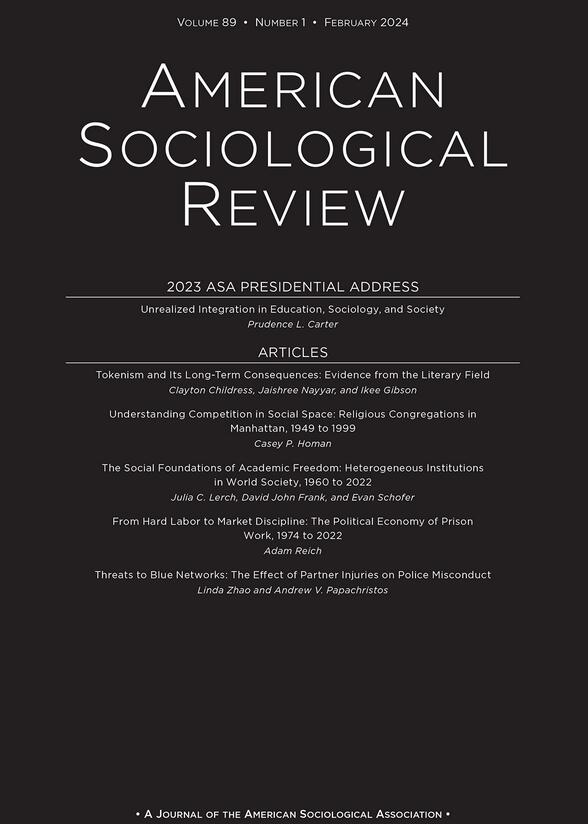The Corner, the Crew, and the Digital Street: Multiplex Networks of Gang Online-Offline Conflict Dynamics in the Digital Age
IF 6.2
1区 社会学
Q1 SOCIOLOGY
引用次数: 0
Abstract
Social media is increasingly intertwined into people’s lives, spurring questions about the relationships between online behavior and offline actions. We advance knowledge in conflict dynamics by using a multiplex network framework that conceptualizes online and offline gang relationships as co-constitutive networks—online and offline relationships often overlap and entangle in complex ways that influence behavior in both the virtual and real worlds. We propose a mixed-methods abductive approach for digital data that uses qualitative analyses to challenge and corroborate quantitative analyses of online gang conflict. Synthesizing data from Facebook posts by alleged gang members, maps of gang territory, and police records of offline shooting events, we show that online gang conflicts are not random attacks but targeted network relationships, and such online relationships are dependent on offline geographic relationships and shooting history relationships between gangs. Our mixed-methods approach further shows via qualitative analyses that the statistical network associations are based on cultural-specific language surrounding gang names and symbols, neighborhood streets, and prominent gang members. Our approach underscores how mixed-methods and qualitative approaches are essential in unpacking “big data” and computational methods in understanding the multiplex nature of group conflict.角落,船员和数字街道:数字时代帮派线上-线下冲突动态的多重网络
社交媒体越来越多地融入人们的生活,引发了人们对在线行为和离线行为之间关系的质疑。我们通过使用一个多重网络框架来推进冲突动力学方面的知识,该框架将在线和离线帮派关系概念化为共同构成的网络——在线和离线关系经常以复杂的方式重叠和纠缠,从而影响虚拟和现实世界中的行为。我们提出了一种用于数字数据的混合方法溯因方法,该方法使用定性分析来挑战和证实网络帮派冲突的定量分析。综合据称帮派成员在脸书上发布的帖子、帮派领地地图和警方对线下枪击事件的记录,我们发现,在线帮派冲突不是随机攻击,而是有针对性的网络关系,这种在线关系取决于帮派之间的线下地理关系和枪击历史关系。我们的混合方法通过定性分析进一步表明,统计网络关联是基于围绕帮派名称和符号、社区街道和知名帮派成员的特定文化语言。我们的方法强调了混合方法和定性方法在解开“大数据”和理解群体冲突的多重性质的计算方法方面是至关重要的。
本文章由计算机程序翻译,如有差异,请以英文原文为准。
求助全文
约1分钟内获得全文
求助全文
来源期刊

American Sociological Review
SOCIOLOGY-
CiteScore
13.30
自引率
3.30%
发文量
35
期刊介绍:
The American Sociological Association (ASA) is a non-profit membership association established in 1905. Its mission is to advance sociology as a scientific discipline and profession that serves the public good. ASA is comprised of approximately 12,000 members including faculty members, researchers, practitioners, and students in the field of sociology. Roughly 20% of the members work in government, business, or non-profit organizations.
One of ASA's primary endeavors is the publication and dissemination of important sociological research. To this end, they founded the American Sociological Review (ASR) in 1936. ASR is the flagship journal of the association and publishes original works that are of general interest and contribute to the advancement of sociology. The journal seeks to publish new theoretical developments, research results that enhance our understanding of fundamental social processes, and significant methodological innovations. ASR welcomes submissions from all areas of sociology, placing an emphasis on exceptional quality.
Aside from ASR, ASA also publishes 14 professional journals and magazines. Additionally, they organize an annual meeting that attracts over 6,000 participants. ASA's membership consists of scholars, professionals, and students dedicated to the study and application of sociology in various domains of society.
 求助内容:
求助内容: 应助结果提醒方式:
应助结果提醒方式:


